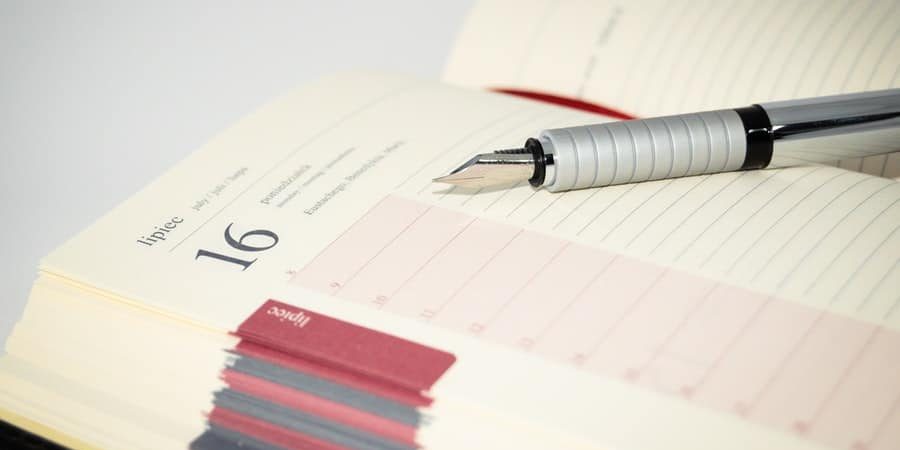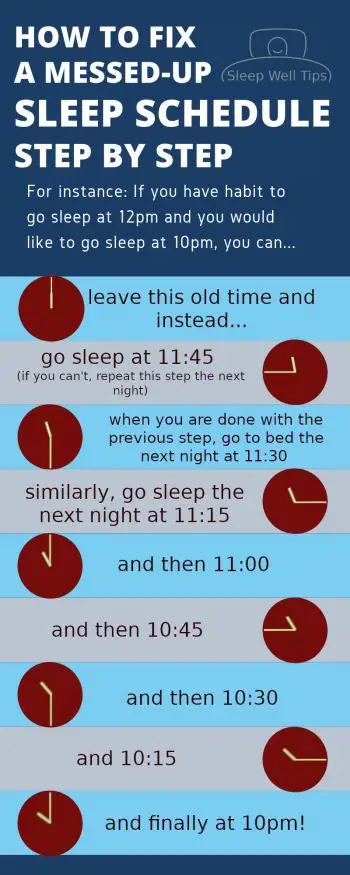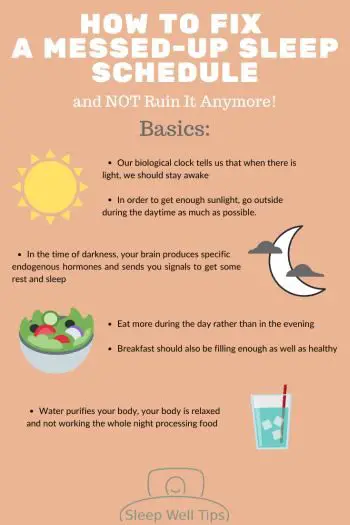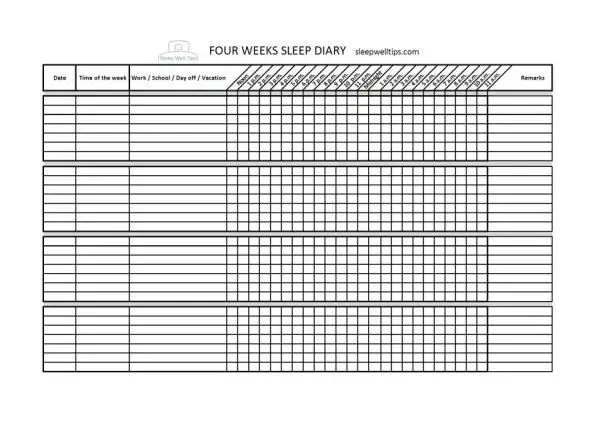
Medically Reviewed by
Nana Sebiskveradze – Doctor of Medicine (M.D.)
October 29, 2020
Like many of you, I faced a problem of sleep regimen disturbance, a so-called “messed up sleep schedule.” It was in different periods and for different durations in my life. So, for a long time, I wanted to find a good solution to fix it. Luckily, when I found an affordable option, I fixed it quite simply. The main question is: Are you going to take this challenge and follow it strictly?
How can you fix your sleep schedule? You can fix your sleep schedule using a step-by-step process. This means that you must take some strict actions to get your sleep schedule on the right track again. It is essential to understand how the changes of light and darkness as well as eating and exercise affect your sleep.
Unfortunately, nowadays more and more people feel that they have problems keeping up with a good sleep schedule. Using the methods described in this blog post, you can quickly fix your sleep schedule and then benefit from a stable sleep schedule.
To get straight to the point:
How Do You Fix Your Sleep Schedule Step by Step?
You might be able to change your sleep schedule little by little. How is it possible?
Let’s say you would like to go to sleep at 10:00 p.m. every night, but lately, you have been going to sleep around 12:00 a.m. How do you change the schedule so that you can fall asleep at 10:00 p.m.?
First, it might not be good to try making radical changes and just go to sleep at 10:00 p.m. the next evening. Instead, do it step by step. So, for instance, if you want to change your sleep time from 12:00 p.m. to 10:00 p.m., you should try to:
- Go to sleep the next night at 11:45 p.m.
- When you succeed in falling asleep at that time, the following night you can change the time to 11:30 p.m.
- Again, when you succeed in falling asleep at that time, change the sleep time to 11:15 p.m.
- And so on. Change your sleeping time a little bit earlier until you reach your goal: 10:00 p.m. in this example.
If you feel so, you may also skip steps on the grey background and then accomplish only every other step.
It might not be easy to follow such a specific schedule, but there is something that can help you with this. If you want to be very specific with the time, you can use your smartphone or just a regular alarm clock and set a “reverse alarm.” That means that you should set your alarm at the time when you want to sleep.
This tip works even better if you need to wake up the same time every day. And even if you don’t have to, try to wake up at the same time. If you wake up at the same time every morning, it will also get much more comfortable to go to sleep at the same time or even earlier.
Why Is It So Hard to Change Your Sleep Schedule?
When you notice that your sleep schedule is out of control, you probably feel that you can’t do anything about the issue anymore. It’s so frustrating! No matter how hard you try, you might feel like you have no idea what to do or how to start.
There might be some days when you need to take care of many things that require you to stay awake longer than usual. Or, there might be some other reason why you can’t go to sleep early. The following days, you might notice that your sleep schedule is worsening once more.
Often, when you travel a long distance to a different time zone, you will suffer at least some jet lag, which causes you some problems, as your internal clock is out of tune with the local time. You want to get it back on track as soon as possible and try to minimize all problems caused by jet lag.
What actions do you need to follow to change your sleep schedule and not ruin it anymore?
Fixing Your Sleep Schedule – What Should You Do First?
Before you try any of the advice given in this section, you should answers these questions:
- What is the main problem with your sleep schedule?
- Why do you think your sleep schedule is out of control?
- What kind of sleep schedule would you like to follow?
- How determined are you to adapt to the new rule of your everyday life?
For example, when thinking about the reasons why your sleep schedule has fallen out of control, you may think:
Is it because you can’t fall asleep so easily anymore, even though you used to be able to?
Or is it because you use your phone or other electronic devices late at night?
Maybe it’s just that you have stayed awake very late once or twice, and now you would like to go to sleep much earlier, but you feel like you can’t do it as easily as before.
So, in other words, if you can find the reason that causes these problems, you must try to do something about it. It might be just one little detail that you haven’t noticed earlier, or sometimes there is a need for more significant changes.
And, yes, there is something you can do about it!
Why Are the Times of Sunlight and Darkness Crucial When Planning Your Sleep Schedule?
It is surely essential!
What is the point of getting enough light during the daytime?
It has a notable reason. Why are we in an awake state during the daytime and why do we tend to go to bed during the night when there is no more daylight? Have you ever asked yourself why are we so nimble physically and mentally at night and so tuned to daylight activity?
Our biological clock tells us that when there is light, we should stay awake. This is the reason why we are inclined to sleep when we are not exposed to natural sunlight. Our melatonin production activates at the right time in the evening: hence the name “biological clock.”
What was it like a few hundred years ago?
At that time, there were no electric lights. The only way to have some light during the night was to keep a fire.
Nowadays, all kinds of artificial lights might cause problems with our natural day and night cycle, including the light of our mobile phones and TVs.
Does this mean that in the past everyone slept well?
Not necessarily. BUT, nowadays, it has become much more problematic to maintain a regular sleep schedule. The basis for these serve many provocative factors, among which prominent places are occupied by “new-age” technological devices. It is reality: Sometimes we can’t imagine going to bed without our phones or without watching TV.
Think about this: How many hours per day do you use each of your electronic devices? Then, count how many hours you use all of them in total. And then ask yourself, how many hours do you have time to sleep after all this?
You Need Sunlight

In order to get enough sunlight, go outside during the daytime as much as possible. But what if it is necessary to be inside during most of the daylight hours, such as if you have work?
If there is a window, stay close to it.
When you wake up, open the curtains right away and stay close to natural light.
If it is still dark outside when you wake up, turn on the light. Even if the day is not sunny, it is better to get natural light than just artificial light. Why? Simply, it’s more natural for your body and cheaper!
What happens when you get natural light?
I have mentioned in previous articles and will repeat it here too, as this is the milestone for our sleeping routine. Inside the human body are running series of natural endogenous (internal) processes which regulate the vital functions of our organism. One of these processes is our “sleep-awake” cyclic routine, which repeats on each rotation of the Earth, roughly every 24 hours. This so-called circadian rhythm or our “biological clock” helps us to rest and be active according to the daylight time and our geographical location. As this process directly depends on the surrounding natural light, our sleep schedule should be in sync with natural light.
When it is daytime and there is light outside, you should be awake, and when it is dark, you should be sleep. Even though you probably will not go to sleep right away when it gets dark, the darkness will prepare you to get sleepy and urge you to go to bed. This occurs because, without the sun, our organism begins to produce a night hormone regulator (melatonin).
What more benefits are there?
You are happier, more productive, and you can be more focused while receiving enough natural light. A study shows that office workers whose workplace has windows enjoy a much better quality of life than workers who don’t get any natural light during the workday.
How can you get more natural light during the day?
- Do your morning routines near a window or, if possible, outside.
- If possible, walk to work or school.
- Do some outdoor activities every day. You don’t even have to have a dog to do so!
- At lunchtime, if possible, go out to eat.
- Go out with your family regularly.
So, try to get as much natural light as possible during the daytime.
Now, here’s another question: How about the time of darkness?
Why Do You Need Darkness to Keep up Your Schedule Routine and Sleep Comfortably?

We need darkness when it is time to sleep. In the time of darkness, your brain produces specific endogenous hormones (see above melatonin) and sends you signals to get some rest and sleep.
That is why melatonin acts as a crucial part of fixing your sleep schedule. In a typical situation, secretion of this hormone in our body maintains our normal daily “sleep-awake” cycle.
But what if you feel like it is not working correctly?
Many people feel that when they use natural products that include melatonin, they can go to sleep much easier. I have tried it a few times, and I feel like it helped me.
Should you use these kinds of products? It’s entirely up to you. However, there are a lot of studies which clearly show the benefit of melatonin products when facing sleep problems.
How can you get refreshing light if it is dark outside?
In some parts of the world, at least for part of the year, the time of natural daylight is very short. If you feel that it is tough to stay awake, or you feel like your sleeping schedule is totally wrong, you can try to use a light therapy pad.
When you are using the light therapy pad, it can keep you fresh and might help you follow a good sleep schedule. For example, you can use it when there is a dark season where you live. Here is an excellent example of a light therapy pad.
How to Keep Dark When You Want to Sleep?
You might need good curtains that block all light from outside. On the other hand, you will need natural light in the daytime, so keep curtains open during the day. Don’t use electronic devices, which emit blue light, late at night.
If you can’t find good enough curtains, or you can’t sleep in a totally-dark room for some other reason, you might need a sleep mask.
There are tons and tons of different kinds of sleep masks. However, we can make things much more comfortable: If you need a good sleep mask, you can check these out. An excellent sleep mask like this one feels natural, blocks the light well, and won’t chafe or feel uncomfortable.
Why Is It Crucial to Avoid Blue Light When You Want to Sleep?
Blue light gives a signal to your brain that it is daytime. It is what you want to avoid in the evening. If you must use a mobile phone or other devices that emit blue light in the evening, you can use blue light filters. There are many good apps that filter blue light from the screen of your mobile device.
You might want to get a free screen dimmer app, and, actually, there are some good free ones. But I have found that, with some of these free apps, there are some reliability problems.
One of the most significant issues I have found is that when you are using this kind of screen dimmer app in the evening, it might suddenly stop working and your mobile device screen turns bright in an instant. Not a good call.
That is why you want to make sure that your app has all the functions you need and it really keeps your mobile device screen dimmed when necessary. You may check out these apps and see which one fits your needs.
How Can a Routine Help You Keep up Your Sleep Schedule?
I hate the word “routine”! Do you feel the same? If so, I can relate to you.
But if you want to keep up with a stable sleep schedule, you must establish some routines.
Try to go to sleep at the same time every night. At least try it. It might be very hard, but remember: Do you really want to solve this problem? If so, it would be better to try to follow a routine.
Of course, there are probably some things you must do in the evening, and sometimes you just can’t avoid those things, and that is why you can’t always go to sleep early enough. Maybe you have some extra work to do, or you want to celebrate one night and go to sleep a little bit later. But if possible, try not to stay awake for longer than you have decided. That includes weekends and holidays.
How Much Sleep Do You Need?
You might need to find out how many hours you need to sleep each night. Is it eight hours for you, or more, or less? Actually, every one of us needs a different quantity of sleep each night. Eight hours is just the average, but it doesn’t work for everyone.
So, How Much Sleep Is Enough for You?
It is possible to test this out when you don’t need to wake up early the next morning; for example, during a holiday. Keep a sleep journal during that time and see how long you sleep naturally when you are not sleep deprived.
To keep up the proper routine, you can set your alarm clock to the same time every morning. If you have a digital alarm clock or if you use a mobile phone as an alarm clock, you can set your alarm time just once, and you won’t have to set it every night when going to sleep.
If you use a snooze with your alarm clock, things might get worse. It will disturb your sleep schedule more and won’t really help with your sleep quality. Actually, you might feel even worse after waking up if you use the snooze function of your alarm clock.
Keep a Record of Your Sleep
When you feel that your sleep schedule is out of your control, it might be hard to find the time and energy to keep a sleep journal. But you can also do it in an easy and straightforward way. Just write down what time you fell asleep and what time you woke up. Why should you do so?
That is how you can quickly figure out what you need to do with your sleep issues.
You can track how many hours you actually sleep and how many hours you probably need to sleep. With this information, you can decide what time you should go to bed every night so that you can get enough sleep.
Another benefit of keeping a sleep journal is that you can notice the time when you fall asleep. Then, you can make some adjustments if needed and change your sleep schedule as described earlier.
You should keep a record of your sleep time as long as you have any problems with sleeping. This will also help you in case you find out that you face severe sleep problems that require you to see a doctor.
In such a situation, it is good to have some information about your sleep and present your documents to your doctor according to what he or she can help you with.
How Does Eating Affect Your Sleep Schedule?

For some of us, it is not a problem to eat anything we want, any time we want, and sleep any time.
But, if you are like me, you might feel that you are such a sensitive person that many small things can affect your sleep regimen and make it very hard to fall asleep.
Actually, eating is not just a small thing! It might quite enough affect our sleep.
So, how and when should we eat?
At least, don’t eat too much. Why not? If you overeat, especially in the late evening, you can provoke two unpleasant things to happen. First of all, after eating, our body begins to digest, which will leave us in an arousal condition, and we will not be able to relax and get ready for sleep. And the second: a full stomach will push our diaphragm in the horizontal position; i.e. in bed. This means that apart from notable discomfort, we may develop difficulty breathing.
Should you schedule your eating times during the day?
Yes, if you want to fall asleep at a specific time.
What are the best times to eat?
Morning
And
Daytime
The basic rule is this: Eat more during the day rather than in the evening. Breakfast should also be filling enough as well as healthy. When the evening comes, you probably aren’t so hungry anymore.
If you need something to eat before sleeping, eat lightly. Healthy snacks could fill that need. Sometimes, just drinking water can be the solution. And, here, we already have the next question:
Does Drinking Affect Your Sleep Schedule?
Yes, drinking can also affect your sleep. If you drink coffee or other caffeinated drinks, you might find out that it is very crucial to avoid drinking them too late in the day.
When is it too late? Some say that after 6:00 p.m. is too late to drink caffeinated products. But, if you have found out that you are very sensitive to caffeine, it might be better to stop drinking coffee even earlier. You need to make a rigorous decision to not drink coffee too late, even if you love drinking it.
Remember, this will affect your sleep the following night. On the following day, you will probably feel enough discomfort, maybe a headache too, if you didn’t get enough quality sleep.
So, even if your very best friend wants to offer you coffee and you know that it is too late, be determined!
Alcohol can also affect your sleep. If you drink alcohol, the quality of your sleep might get worse. When people drink alcohol too much and too often, they can develop problems, which can deteriorate not only their sleep routine.
Alcohol stimulates you, and even if you feel that you can fall asleep after drinking alcohol, your sleep quality becomes much lower.
Is water the best drink?

What are the benefits of drinking water?
It is said that water purifies your body, so your body doesn’t need to do extra work to remove toxins. This means that when you want to sleep, your body is relaxed and not working the whole night processing food.
But, don’t drink too much water! Even though water is healthy to drink, too much water can cause nocturnal discomfort: You will probably need to wake up during the night to go to the bathroom. Also, if you always drink too much water late evening or night, you can wake up the next morning with notable oedema around the eyes and fingers. The cause of such an effect is that, during the sleep process, all body systems work slower, including the kidney’s fluid filtration.
Related Questions:
How Long Does It Take to Adjust to a New Sleep Schedule?
It depends on how determined you are and on your individual circumstances.
But for most of us, it is possible to do it in around one week if the sleep schedule is badly out of control. However, in some rare cases, it is possible to do it in just one night, but this depends on your situation.
Is Staying up All Night a Good Way to Fix Your Sleep Pattern?
Staying up all night and getting good sleep the following night is one possible way to try to fix the messed-up sleep schedule. However, many people face serious problems when trying to stay awake needlessly. Therefore, it is not recommended to do so. But if you feel that you can do it, you need to consider it carefully beforehand.
How Do You Fix Your Sleep Schedule When You Have Jet Lag?
What is jet lag? When traveling by airplane from one time zone to another time zone, you will usually suffer some jet lag because this change happens so fast. Usually, it takes a few days to get back on track when you suffer jet lag. And this happens almost automatically.
If you feel like you want to get your sleep schedule back to normal faster, there are some tips you can try.
Melatonin, which we mentioned earlier, can help with jet lag, too. Then, changing your sleep schedule to the local time might go a little bit faster and smoother.
When Do You Need Professional Help?
If you feel that any of these tips, or any other advice you have read, won’t solve your problem, it might be better to seek professional help.
There are probably some things you can’t do by yourself if you have suffered from this problem for a long time. So, don’t hesitate to ask for help when you feel that your sleep schedule has been out of whack for too long.
Professional help might always be needed when sleep issues are affecting your life too much. If you notice your personal life getting out of control, or if your friendships or marriage are in danger because of this kind of issue, or you just can’t take any actions to fix the problem, you should seek professional help. Don’t give up hope. There is surely something that will help you!
Be Determined
To fix your sleep schedule, you need to be very determined. You need to take strict actions to get your sleep schedule on the right track and keep it up.
Keep up the good routine. You need natural light during the day, and you need to be in the dark in the evening.
Eat healthy, drink the right kinds of drinks, and maintain balance.
It is so easy to read guides that offer strict advice, but it might be much harder to apply them. But, if possible, try to apply at least one of these tips if you suffer from an irregular sleep schedule.
If you find out that it doesn’t help you, then you can pick up the next tip and try that. Do your best to apply it, because it is for your own good.
If you find even better ways to fix your sleep schedule, don’t hesitate to share your experience with others who have similar problems!
Sources:
https://amerisleep.com/blog/reset-sleep-clock/
https://www.webmd.com/sleep-disorders/features/reset-sleep-cycle
Accessed October 29, 2020





